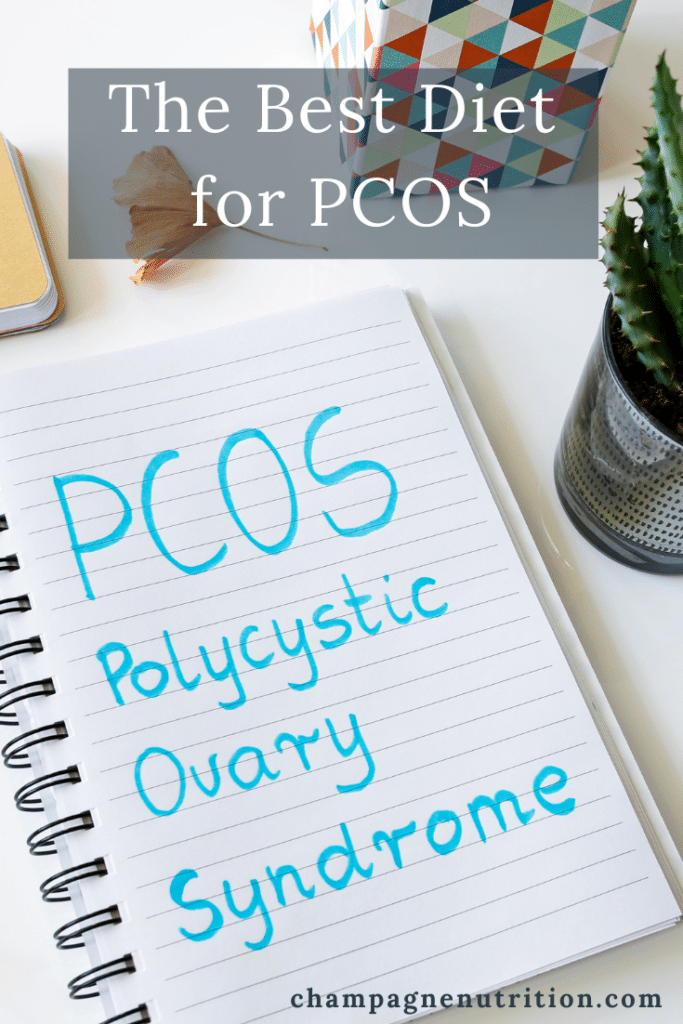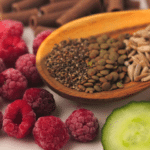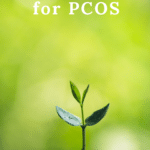What to Eat with PCOS
January 18, 2020 by Ginger Hultin MS RDN
Polycystic ovarian syndrome (PCOS) can be a frustrating condition to deal with. Many people with PCOS are told to lose weight, but weight loss can be very difficult (if not nearly impossible) due to the metabolic and hormonal imbalances that come along with this condition. Shifting the focus from weight to how to eat in a way that puts your body back into balance can be one of the most helpful things you can do. Finding the diet that works for your PCOS may result in weight loss as well, but the most important goal is to bring your body to optimal health to reverse symptoms and prevent complications. I know you’re wondering what to eat with PCOS and I’ve got answers for you in this important post.
Ultimately, what you eat really depends on the individual, as always, and your preferences, history, medications and lifestyle. However there are some common underlying causes of symptoms of PCOS that can be addressed with diet in people. While there is no known cure for PCOS, it can be very well managed through diet, exercise, and the support of supplements in some cases. Keep reading to learn about some of the diets that are thought to be helpful for PCOS. And of course, if you are struggling yourself, please be sure to get a registered dietitian on your team right away.
What you Need to Know About PCOS
Insulin Resistance
To understand how diets may impact PCOS, it is helpful to understand the process of this disease. There are several pathways that affect PCOS, but I’ll focus on the dietary factors here. The majority of people with PCOS have insulin resistance. Insulin is a hormone that tells your body to use glucose (blood sugar) as energy after a carbohydrate-containing meal. Keep in mind that carbohydrates are found in a lot of foods – fruits, veggies, whole grains, beans and nuts/seeds so you’ll definitely be eating foods that contain carbs. That’s not a bad thing!
When the body is resistant to insulin, the cells don’t ‘listen’ to the insulin signals so they don’t take in the blood sugar that they need for energy. Interestingly, this is cell specific. For example, when someone is insulin resistant, their muscle cells will not listen to insulin, but fat cells will. So the body isn’t using glucose/blood sugar efficiently for energy, but fat cells are happy to store it. With most cells not listening to insulin signals, blood glucose/sugar remains high and more insulin is released in an attempt to bring glucose down. Yup: the pancreas is working overtime. And it can get tired which can lead to diabetes. Most of this extra glucose/blood sugar ends up being stored as fat. This is one of the reasons it can be so difficult to lose weight with PCOS.

The Problem with High Insulin and PCOS
Insulin plays a role in regulating sex hormones by stimulating the ovarian cells. The problem with higher than normal insulin is it can hyperstimulate the ovaries to produce more androgens (male hormones). High androgen levels cause many of the classic symptoms of PCOS like weight gain, irregular menstrual cycles, facial hair, and infertility.
Diets for PCOS
If you’re searching for information on PCOS, you’re likely to come across a lot of advice. Vegan? No carb? Low carb? Keto? It’s really hard to understand what’s best for you. Here’s a breakdown of what the research is showing us right now.
Plant Based
Plant based diets (vegan or vegetarian) can be helpful for PCOS because they tend to be anti-inflammatory and contain higher fiber and less saturated fat than omnivorous diets.
Fiber helps slow the digestion and absorption of glucose slightly so there is a steady release over time with less drastic insulin surges.It can be blood-sugar balancing and there’s even some evidence that plant-based diets can help reduce the risk of developing diabetes.
Plant based diets are high in antioxidants and contain more phytonutrients which are compounds found in fruits and vegetables that support hormone regulation and even play a role in gene expression – the way that your genes are talking to your body.
However, it’s important to understand that just because a diet is plant based, it doesn’t mean it’s healthy. Someone can be plant based and still consume processed food that’s high in added sugar- and this would only make PCOS worse because it can cause inflammation and high blood glucose that results in excess insulin release. Remember – Oreos are vegan!
A healthy plant based diet that is beneficial for PCOS is focused on whole foods that are minimally processed and includes a variety of vegetables, legumes, whole grains, and fruits and limits added sugars. You’ll need to make sure that you’ve got a solid plan for getting protein at your meals and snacks but don’t worry, there are a lot of great options like nuts/seeds, tofu, tempeh and edamame, all beans and lentils.
Ketogenic
The ketogenic diet is a very low carbohydrate, high fat diet that puts the body in a state of ‘ketosis’. Basically, eating a low enough amount of carbs (often as low as 20 net grams of carbs!) makes the body switch from glucose/blood sugar as its primary source of energy to ‘ketones’ which are produced from fat. Yup, that’s right. The ketogenic diet helps you burn fat. But please use caution….it’s never that simple or easy and there’s a LOT to consider with this one.
There’s an unhealthy and a healthier approach to this diet (like all diets!). Eating large amounts of high fat meat with butter, cream and no vegetables, fruits or whole grains is not healthy for anyone.
Eating a variety of whole foods based low carbohydrate sources of protein, healthy fats, vegetables, and some low carb fruits like berries may be helpful for PCOS. The reason why a ketogenic diet may be therapeutic for PCOS is it significantly reduces the amount of insulin produced. Protein consumption will cause insulin release to an extent, but not even close to the amount that’s released after eating carbohydrates. This means ovarian cells are no longer being bathed in insulin which, as mentioned above, can hyperstimulate the ovaries to produce the pesky androgens.
So a whole foods based ketogenic diet may be therapeutic for PCOS by this process of lowering androgen production which in turn eliminates most of the common symptoms associated with high androgens.
However, keep in mind that this isn’t some miracle diet for PCOS. There are some potential downsides. A ketogenic diet is very restrictive. To achieve and maintain ketosis, you have to stick to very low carbohydrates which for most people is under 20-30 net grams per day. It can be tempting to “cheat” once in a while if you feel deprived, but being on a ketogenic diet and then suddenly having a high carb meal or dessert is very unhealthy for the body-especially for PCOS. Constipation can be a real issue because of the lack of fiber, you could develop nutrient deficiencies, kidney problems, and if you go off the diet….you’ll likely regain weight back quickly.
For keto to be therapeutic, it really needs to be followed strictly and under the guidance of a doctor and registered dietitian, too. Keto should be avoided by people with a history of disordered eating because of the necessity of adhering to the strict diet protocols and the need to measure consumption of carbs. While there are some promising results in studies, it hasn’t been proven that keto is the best diet for PCOS. Sample sizes in the existing studies are small so it can’t be concluded that the results will be the same for everyone with PCOS. We simply don’t know enough yet. The existing research is compelling, and this diet may be prescribed as a therapeutic diet for PCOS in the future. You can find more information on keto in a post I wrote here.
Mediterranean
A Mediterranean style diet has some promise of being effective in lowering the risk of heart disease, type two diabetes, and other chronic diseases that often come along with PCOS. The Mediterranean diet is a lifestyle focused on whole foods with an emphasis on whole grains, fruits, vegetables, healthy fats, and healthy proteins like salmon. It’s actually primarily plant-based with very little to no red meat/pork and it’s relatively high in healthy fats.
This eating pattern is anti-inflammatory and low glycemic to help with blood sugar issues associated with PCOS. Studies have shown that sticking to a Mediterranean diet lowers insulin resistance so it is likely therapeutic for PCOS. The Mediterranean diet is much less restrictive than keto and can be easier to stick to, offering more options that are realistic for eating with others and eating out or traveling. It includes a variety of whole foods that are rich in healthy fats, fiber, and antioxidants.
If you need some resources, I have a few dietitian friends who have written books about the Mediterranean diet. These are fantastic resources for you!
- The Mediterranean Diet Made Easy: Fresh, Vibrant Recipes for Better Health by Brynn Mcdowell
- Easy Everyday Mediterranean Diet Cookbook: 125 Delicious Recipes from the Healthiest Lifestyle on the Planet by Serena Ball, MS, RD and Deanna Segrave-Daly, RD
- The Heart Disease Prevention Cookbook: 125 Easy Mediterranean Diet Recipes for a Healthier You by Cheryl Mussatto MS RD LD
- Prevention Mediterranean Table: 100 Vibrant Recipes to Savor and Share for Lifelong Health: A Cookbook by the editors of Prevention Magazine, Jennifer Mcdaniel, and Marygrace Taylor
- The Mediterranean Diet Cookbook for Two: 100 Perfectly Portioned Recipes for Healthy Eating by Anne Danahy RDN
- Mediterranean Diet Meal Prep Cookbook: Weekly Plans and Recipes for a Healthy Lifestyle by Lindsey Pine MS RDN CLT
If You’re Wondering What to Eat with PCOS…
The diets above all have some benefits, but there is no one diet that’s currently prescribed for PCOS. Any of the diets talked about here may help, but what really matters is finding a whole foods based diet that you can follow long-term. Going on and off diets will cause more severe hormone imbalances and inflammation which can worsen symptoms of PCOS. So the best diet for PCOS is the one that works best for you, that you can stick to without feeling deprived. A dietitian can help you find the diet that will be most beneficial to you. Please make sure to pop on my schedule if I can help you today!

Ginger Hultin,MS, RD, CSO
Thanks for visiting! If you're struggling with a cancer diagnosis, autoimmune condition, gut health problems, or even a medical mystery, nutrition can make a HUGE difference in your day-to-day life. I run a virtual, concierge private practice where I partner with my clients over time to help them improve their health through nutrition. Be sure to visit the blog for easy, plant-based, anti-inflammatory recipes and our "Resources" page for a variety of self-paced programs, books, e-books, and nutrition podcast episodes.


